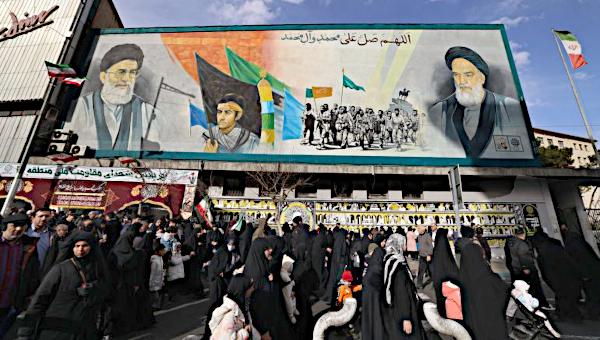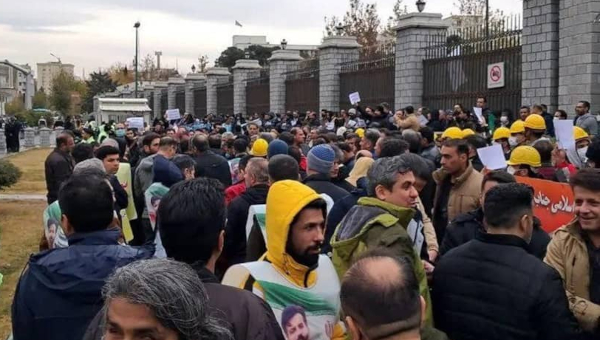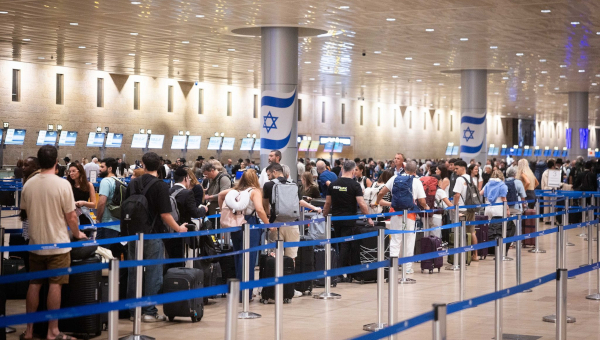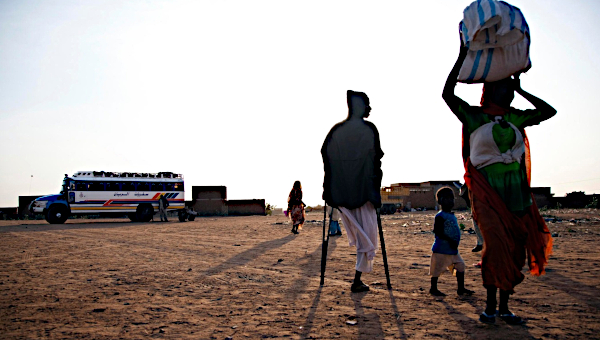Tour Builds Venezuela Solidarity in Canada
Federico Fuentes and Kiraz Janicke concluded their ten-day tour of Canada on March 7, with a rally in Vancouver entitled “Change the System, Not the Climate.” Fuentes shared the platform with Pablo Solon, Bolivia’s UN ambassador and chief spokesperson on climate change. Fuentes described the leading role played by Venezuelan president Hugo Chavez, together with Bolivia’s Evo Morales, in rallying forces to oppose the climate sell-out by Canada and other rich countries at the recent UN conference in Copenhagen.
Fuentes and Janicke are Australian-based activists who live in Venezuela and write for Venezuelanalysis.com and other publications. Fuentes is also editor of the Bolivia Rising blog and an associate of the Centro Internacional Miranda, a government-funded research institute in Caracas.
The Fuentes-Janicke tour included almost two dozen presentations, attended by audiences totalling 800 persons. Meetings were held in Montreal, Ottawa, Kingston, Toronto, Waterloo, Vancouver, and Victoria.
The tour provided a vivid picture of the state of Venezuela solidarity across the country. “Meetings were sponsored by a wide spectrum of groups, including every Venezuela solidarity current in the cities where we spoke,” says Fuentes. “I was repeatedly told that the audiences were not the same old faces. Many new people came, asking probing questions about Venezuelan reality.” Yet almost all those present agreed in supporting the Bolivarian movement in Venezuela, he adds.
“Typically, people hung around after the meetings, full of questions,” Fuentes says.
“Take Montreal, for example,” says Janicke. “Meetings were sponsored by all three local groups: the Bolivarian Society, Hands Off Venezuela, and the Peace Base, with strong presence and moral support from the local Venezuelan consulate. Federico and I had fruitful discussions with consular and embassy representatives in Ottawa, Montreal, and Toronto, and we distributed many copies of the embassy’s excellent publication, The Bolivarian.
The nature of events varied widely. “There were graduate seminars and open campus meetings; union gatherings and city-wide events,” says tour organizer Suzanne Weiss. “Federico and Kiraz related the Bolivarian process to Venezuela’s support for world struggles: Haiti and Bolivia (in Vancouver), Palestine (in Waterloo), Indigenous nations (in Kingston).”
In Vancouver, Fuentes spoke at a luncheon of the Vancouver & District Labour Council as well as at a regional meeting of the Public Service Alliance of Canada. “They wanted to know more about the labour movement in Venezuela,” Fuentes says. “They were interested in the labour tours of Venezuela organized by the Australia Venezuela Solidarity Network. They wanted to help Bolivarian unions in Venezuela win support in the International Labour Organization.”
In Toronto, the main tour events formed part of a “Three Days for Venezuela” event co-sponsored by eleven solidarity and progressive organizations. Fuentes and Janicke were among more than 25 presenters at an all-day Venezuela teach-in. “About 100 participants took part in the twelve different workshops and plenaries,” Weiss reports. “After a long day of discussion, a good majority of participants stayed for the final session, on organizing solidarity in Canada.”
Participants in the teach-in represented a wide range of opinion on Venezuela, Weiss notes. “There was a frank exchange among different viewpoints. But all were agreed that Venezuela faces grave dangers today. Everyone stood firm with Venezuela against threats from imperialism and rightist forces within the country.”
Probing Questions
“The most frequently asked question,” Fuentes says, “was what would happen to Venezuela if Chavez were removed from the scene – or, another variant – whether the Venezuelan process was too much of a top-down process. I tried to explain Chavez’s indispensable role in linking together a Bolivarian movement that is both socially and ideologically very diverse. I talked of the movement’s great strength at the grass roots, and of how it has progressed through an interplay between initiatives at the base and at the presidential level.”
There was much interest in questions concerning oil and the environment as well as the community councils, Fuentes says.
“Almost all questions were sympathetic to the Venezuelan process,” Janicke recalls. “I was asked about the character of nationalizations, popular education, what the changes mean for people’s lives, and whether socialism in Venezuela is possible. Others asked what Canada’s role is in Venezuela and why [foreign affairs minister] Peter Kent is making such sharp attacks on Venezuela’s government.”
According to Weiss, the tour highlights the great potential to expand support for the Venezuelan people in their quest for sovereignty and twenty-first century socialism. “There is an urgent need today to broaden the active solidarity movement beyond the ideologically committed, to a broader spectrum of progressive opinion in Canada,” says Weiss. “The tour shows that this can be done. The Venezuela solidarity movement is still small. But its participants come from many backgrounds, many milieus; they can be catalysts for action on a broader stage. The solidarity movement can become more inclusive and more diverse in point of view — yet remain firmly united in defending the revolutionary process in Venezuela.”
For further information on the tour and to contact sponsoring organizations, email vzteachin@hotmail.com. Socialist Project has posted a video of the tour meeting in Toronto. •
TOUR EVENTS
February 25, Toronto
- Demonstration in defence of Venezuela outside Venezuelan consulate.
February 26, Toronto
- Graduate seminar at York University, Toronto.
- City-wide forum on “Venezuela: Profile of a People’s Movement”.
February 27, Toronto
- Teach-in on “Venezuela’s Bolivarian Revolution – The Second Decade.”
Sponsors: Ontario Public Interest Research Group, Toronto • Centre for Social Justice • Barrio Nuevo o Hands Off Venezuela • Latin America Solidarity Network, Toronto • Latin@s Canada • Louis Riel Bolivarian Circle • Socialist Project • Toronto Bolivia Solidarity • Toronto Haiti Action Committee • Venezuela We Are With You Coalition/Coalicion Venezuela Estamos Contigo
March 1, Kingston
- Meeting on “Indigenous Resistance and Popular Sovereignty in Bolivia and Venezuela.”
March 1, Ottawa
- Meeting at headquarters of the Public Service Alliance of Canada, sponsored by Socialist Project and co-sponsored by the Critical Social Research Collaborative, Salvadorian Canadian Association of Ottawa, Territorio Libre, and Communist Party of Canada.
March 2, Waterloo
- “Venezuela’s Support for Palestinian Struggle” at Israeli Apartheid Week.
March 2, Ottawa and Gatineau
- Meetings at the University of Ottawa and Carleton University in Ottawa.
- Meeting at the Universite du Quebec (Outaouais campus).
March 3, Toronto
- “Popular Education and Endogenous Development in Venezuela,” public seminar at Ontario Institute of Studies in Education.
March 3, Victoria
- “The Bolivarian Revolution: The Second Decade – Profile of a People’s Movement,” Goods for Cuba Campaign and the Island Solidarity Centre Society.
March 4-5, Montreal
- “The Bolivarian Revolution in Venezuela: Internal and External Threats,” meetings at McGill University, Dawson College, Universite du Quebec à Montreal, Concordia University, visit organized by Societe Bolivarienne du Quebec/Hands Off Venezuela, supported by Base de Paix Montreal.
March 4-7, Vancouver
- “Venezuela: The State of the Bolivarian Revolution,” sponsored by Vancouver Socialist Forum.
- “Hope for Haiti in Latin America,” organized by Haiti Solidarity BC.
- “Venezuelan Labour in Revolution,” luncheon with Vancouver and District Labour Council and meeting with Public Service Alliance of Canada Regional Council.
- “Change the System, Not the Climate,” citywide forum sponsored by Canada Bolivia Solidarity Committee, Vancouver Socialist Forum, Hands Off Venezuela Western Canada Chapter, Unitarian Church of Vancouver Social Justice Committee.





